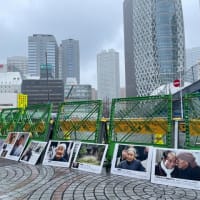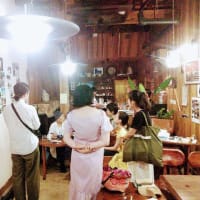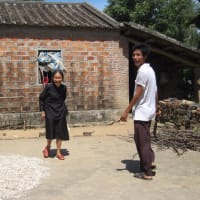マイク・ホンダ議員のスピーチ全文を、ご紹介します。
(英文 3月6日)
SPEECH OF HON. MICHAEL M. HONDA OF CALIFORNIA
IN THE HOUSE OF REPRESENTATIVES
TUESDAY, MARCH 6, 2007
l Mr. HONDA. Madam Speaker, I rise today in shock and disappointment at
recent news from Japan, where it was reported that Prime Minister Shinzo
Abe has denied the historical fact that the Japanese Imperial Army
forced as many as 200,000 women into sex slavery during the Second World
War, and publicly stated that Japan will not issue an apology, even if a
resolution is passed in the United States House of Representatives.
l On February 15, a hearing on this issue was held by the Subcommittee
on Asia and the Pacific of this House's Committee on Foreign Affairs.
This was truly a historic occasion, because it brought three survivors
of the Comfort Women horrors to Washington to tell their very real, very
personal stories. Not only did that hearing give us an opportunity to
reflect on one of the darker episodes of human history, it provided us
with a chance to make history by bringing that darkness and forgotten
tragedy to light and justice.
l Those three women, now advanced in years--Jan Ruff O'Herne, Yong Soo
Lee, and Koon Ja Kim--traveled thousands of miles to bring their stories
to us, stories which were for many decades kept only in their hearts for
reasons best understood only by those who had to endure what these
women--and some 200,000 others throughout Asia--had to endure.
l Some might ask: Why, more than 60 years after the end of the Second
World War, are we discussing the ordeals of the so-called Comfort Women?
Shouldn't this be considered a mere footnote to history? Aren't there
more important or more pressing issues at hand in the early years of the
21st century?
l Those who ask such questions fail to comprehend the lasting relevance
of the experience of these women during the war, and of the continuing,
obstinate failure, in the face of overwhelming evidence and
international scrutiny, of the Government of Japan to formally
acknowledge, apologize and accept unequivocal responsibility for their
suffering and torture.
l The recent news from Tokyo and Prime Minister Abe's inexplicable
denial adds greater resonance to our exploration of this topic. One
Japanese Diet Member said, with no apparent irony, that the Comfort
Women brothels were no different than a buffet lunchroom. Nariaki
Nakayama said bluntly: ``Some say it is useful to compare the brothels
to college cafeterias run by private companies, who recruit their own
staff, procure foodstuffs and set prices.''
l Madam Speaker, without objection, I wish to insert into the
CONGRESSIONAL RECORD an article on this issue that appeared in the New
York Times on Thursday, March 1, reporting Prime Minister Abe's remarks.
(英文 3月6日)
SPEECH OF HON. MICHAEL M. HONDA OF CALIFORNIA
IN THE HOUSE OF REPRESENTATIVES
TUESDAY, MARCH 6, 2007
l Mr. HONDA. Madam Speaker, I rise today in shock and disappointment at
recent news from Japan, where it was reported that Prime Minister Shinzo
Abe has denied the historical fact that the Japanese Imperial Army
forced as many as 200,000 women into sex slavery during the Second World
War, and publicly stated that Japan will not issue an apology, even if a
resolution is passed in the United States House of Representatives.
l On February 15, a hearing on this issue was held by the Subcommittee
on Asia and the Pacific of this House's Committee on Foreign Affairs.
This was truly a historic occasion, because it brought three survivors
of the Comfort Women horrors to Washington to tell their very real, very
personal stories. Not only did that hearing give us an opportunity to
reflect on one of the darker episodes of human history, it provided us
with a chance to make history by bringing that darkness and forgotten
tragedy to light and justice.
l Those three women, now advanced in years--Jan Ruff O'Herne, Yong Soo
Lee, and Koon Ja Kim--traveled thousands of miles to bring their stories
to us, stories which were for many decades kept only in their hearts for
reasons best understood only by those who had to endure what these
women--and some 200,000 others throughout Asia--had to endure.
l Some might ask: Why, more than 60 years after the end of the Second
World War, are we discussing the ordeals of the so-called Comfort Women?
Shouldn't this be considered a mere footnote to history? Aren't there
more important or more pressing issues at hand in the early years of the
21st century?
l Those who ask such questions fail to comprehend the lasting relevance
of the experience of these women during the war, and of the continuing,
obstinate failure, in the face of overwhelming evidence and
international scrutiny, of the Government of Japan to formally
acknowledge, apologize and accept unequivocal responsibility for their
suffering and torture.
l The recent news from Tokyo and Prime Minister Abe's inexplicable
denial adds greater resonance to our exploration of this topic. One
Japanese Diet Member said, with no apparent irony, that the Comfort
Women brothels were no different than a buffet lunchroom. Nariaki
Nakayama said bluntly: ``Some say it is useful to compare the brothels
to college cafeterias run by private companies, who recruit their own
staff, procure foodstuffs and set prices.''
l Madam Speaker, without objection, I wish to insert into the
CONGRESSIONAL RECORD an article on this issue that appeared in the New
York Times on Thursday, March 1, reporting Prime Minister Abe's remarks.























